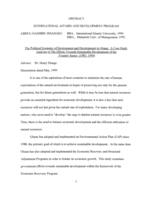- Collection:
- Atlanta University and Clark Atlanta University Theses and Dissertations
- Title:
- The political economy of environment and development in Ghana: a case study analysis of the efforts towards sustainable development of the forestry sector (1983- 19941, 1999
- Creator:
- Issahaku, Abdul-Nashiru
- Date of Original:
- 1999-05-01
- Subject:
- Degrees, Academic
Dissertations, Academic - Location:
- United States, Georgia, Fulton County, Atlanta, 33.749, -84.38798
- Medium:
- theses
- Type:
- Text
- Format:
- application/pdf
- Description:
- It is one of the aspirations of most countries to minimize the rate of human exploitation of the natural environment in hopes of preserving not only for the present generation, but for future generations as well. While it may be true that natural resources provide an essential ingredient for economic development, it is also a fact that such resources will not last given the current rate of exploitation. For many developing nations, who most need to 'develop,' the urge to deplete natural resources is even greater. Thus, there is the need to balance economic development and the efficient utilization of natural resources. Ghana has adopted and implemented an Environmental Action Plan (EAP) since 1988. the primary goal of which is to achieve sustainable development. At the same time Ghana has also adopted and implemented the Economic Recovery and Structural Adjustment Programs in order to bolster its economic growth. This study examines government efforts towards sustainable development within the framework of the Economic Recovery Program. The study utilizes history and a case study of the forestry sector of Ghana to analyze and to examine the impact of Economic Recovery Program (ERP) on deforestation. The findings from this analysis indicate that, the Economic Recovery and Structural Adjustment Programs have contributed significantly to exacerbate the rate of deforestation in Ghana. It was shown that SAP, in addition to providing the policy incentives for businesses and firms to extract more resources (e.g., timber resources), also affects rural people in ways that motivate them to denigrate the environment. This study had shown that availability of rural economic opportunities/livelihood or the lack thereoff, is directly linked to environmental degradation in that increasing levels of economic indigence result in inordinate natural resource exploitation. Additionally, besides poverty and the national debt situation, the study also establishes a demonstrated link between the transition to democracy and increased natural resource exploitation. In order for the government's efforts towards sustainable development to materialize, Ghana needs to address the needs of the rural poor. She would also have to ensure compliance with rules and regulations. The study provides a discussion that isintended to draw attention to viable alternatives to dealing with the problem.
- External Identifiers:
- Metadata URL:
- http://hdl.handle.net/20.500.12322/cau.td:1999_issahaku_abdul_nashiru
- Rights Holder:
- Clark Atlanta University
- Holding Institution:
- Atlanta University Center Robert W. Woodruff Library
- Rights:
-
